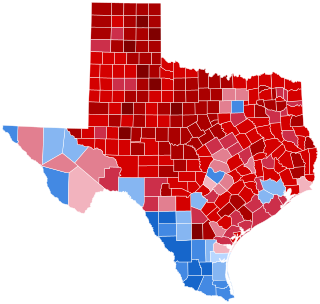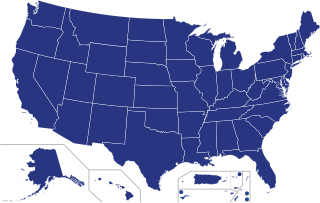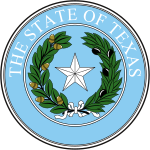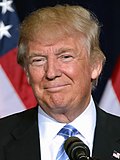
Voters of the Republican Party elected state delegations to the 2012 Republican National Convention in presidential primaries. The national convention then selected its nominee to run for President of the United States in the 2012 presidential election. There were 2,286 delegates chosen, and a candidate needed to accumulate 1,144 delegate votes at the convention to win the nomination. The caucuses allocated delegates to the respective state delegations to the national convention, but the actual election of the delegates were, many times, at a later date. Delegates were elected in different ways that vary from state to state. They could be elected at local conventions, selected from slates submitted by the candidates, selected at committee meetings, or elected directly at the caucuses and primaries.

The 2016 Republican National Convention, in which delegates of the United States Republican Party chose the party's nominees for president and vice president in the 2016 U.S. presidential election, was held July 18–21, 2016, at Quicken Loans Arena in Cleveland, Ohio. The event marked the third time Cleveland has hosted the Republican National Convention and the first since 1936. In addition to determining the party's national ticket, the convention ratified the party platform.

Presidential primaries and caucuses of the Republican Party took place within all 50 U.S. states, the District of Columbia, and five U.S. territories between February 1 and June 7, 2016. These elections selected the 2,472 delegates that were sent to the Republican National Convention. Businessman and reality television personality Donald Trump won the Republican nomination for president of the United States.
Twelve presidential debates and nine forums were held between the candidates for the Republican Party's nomination for president in the 2016 United States presidential election, starting on August 6, 2015.
The 2016 presidential campaign of Ted Cruz, the junior United States senator from Texas, was announced on March 23, 2015. He was a candidate for the Republican Party's 2016 presidential nomination and won the second-most state contests and delegates. Cruz themed his campaign around being an outsider and a strict conservative. In the crowded early field, he chose not to directly confront the leading candidate, Donald Trump, who was also viewed as an outsider candidate. His cordial and sympathetic tone towards Trump contrasted with the more critical approach of rivals such as Jeb Bush, John Kasich, Marco Rubio, and Rand Paul.

The 2016 presidential campaign of John Kasich, the 69th governor of Ohio, was announced on July 21, 2015. He was a candidate for the 2016 Republican Party presidential nomination. He earned 154 delegates and won only one contest, his home state, Ohio. Kasich suspended his campaign on May 4, 2016, one day after becoming the last major challenger to Donald Trump for the nomination. Kasich vied to become the first Pennsylvania native to hold the office since James Buchanan in 1856, as well as the first from the city of Pittsburgh to do so.

The 2016 New Hampshire Republican presidential primary, which took place on February 9, was the second major vote of the cycle. Donald Trump was declared the winner with 35.2% of the popular vote and picked up 11 delegates, while John Kasich emerged from a pack of candidates between 10 and 20% to capture second place with 15.8% of the vote and picked up four delegates.

This article contains the results of the 2016 Republican presidential primaries and caucuses, the processes by which the Republican Party selected delegates to attend the 2016 Republican National Convention from July 18–21. The series of primaries, caucuses, and state conventions culminated in the national convention, where the delegates cast their votes to formally select a candidate. A simple majority (1,237) of the total delegate votes (2,472) was required to become the party's nominee and was achieved by the nominee, businessman Donald Trump of New York.

The 2016 United States presidential election in Georgia was held on Tuesday, November 8, 2016, as part of the 2016 United States presidential election in which all 50 states plus the District of Columbia participated. Georgia voters chose electors to represent them in the Electoral College via a popular vote, pitting the Republican Party's nominee, businessman Donald Trump, and running mate Indiana Governor Mike Pence against Democratic Party nominee, former Secretary of State Hillary Clinton, and her running mate Virginia Senator Tim Kaine. Georgia has 16 electoral votes in the Electoral College.

The 2016 United States presidential election in Texas took place on November 8, 2016, as part of the 2016 United States presidential election. Primary elections were held on March 1, 2016.

Although Puerto Rico did not participate in the November 8, 2016, general election because it is a territory and not a state, the five non-incorporated territories that send delegates to the United States House of Representatives participated in the presidential primaries.

The 2016 Nevada Republican presidential caucuses took place on February 23 in the U.S. state of Nevada, marking the Republican Party's fourth nominating contest in their series of presidential primaries ahead of the 2016 presidential election.
The Never Trump movement is an ongoing conservative movement that opposes Trumpism and U.S. president-elect Donald Trump. It began as an effort on the part of a group of Republicans and other prominent conservatives to prevent Republican front-runner Trump from obtaining the 2016 Republican Party presidential nomination.

The 2016 Wisconsin Republican presidential primary was held on April 5 in the U.S. state of Wisconsin as one of the Republican Party's primaries ahead of the 2016 presidential election. Texas senator Ted Cruz won the contest with 48%, ahead of nationwide frontrunner Donald Trump by 13 percentage points. Taking advantage of the state's two-level "winner takes all" provision, Cruz took 36 out of the 42 available delegates.

The 2016 Indiana Republican presidential primary was held on May 3 in the U.S. state of Indiana as one of the Republican Party's primaries ahead of the 2016 presidential election. This was a winner-take-all election, so Donald Trump, who came in first in the popular vote, won all the delegates.

The 2016 Ohio Republican presidential primary took place March 15 in the U.S. state of Ohio, as a part of the Republican Party's series of presidential primaries ahead of the 2016 presidential election. The Ohio primary was held alongside Republican primary elections in Florida, Illinois, Missouri and North Carolina, along with the Democratic contest in Ohio.

Presidential primaries and caucuses of the Republican Party took place in many U.S. states, the District of Columbia, and five U.S. territories from February 3 to August 11, 2020, to elect most of the 2,550 delegates to send to the Republican National Convention. Delegates to the national convention in other states were elected by the respective state party organizations. The delegates to the national convention voted on the first ballot to select Donald Trump as the Republican Party's nominee for president of the United States in the 2020 election, and selected Mike Pence as the vice-presidential nominee.
The Northern Mariana Islands Republican Caucuses took place on March 15, 2016, also dubbed "Super Tuesday II." Caucus attendees sent 9 delegates to the Republican National Convention in Cleveland, Ohio on behalf of the Northern Mariana Islands.

The 2016 Massachusetts Republican presidential primary was held on Tuesday March 1, as one of the Republican Party's 2016 presidential primaries. Massachusetts was one of eleven states that held both their Democratic and Republican presidential primaries on that day, dubbed "Super Tuesday". 42 delegates were allocated proportionally to all candidates who received at least 5 percent of the vote in the primary.

Presidential primaries and caucuses of the Republican Party took place within all 50 U.S. states, the District of Columbia, and five U.S. territories between January 15, 2024, and June 4, 2024, ahead of the 2024 United States presidential election. These elections selected most of the 2,429 delegates to be sent to the Republican National Convention. Former president Donald Trump was nominated for president of the United States for a third consecutive election cycle.


















